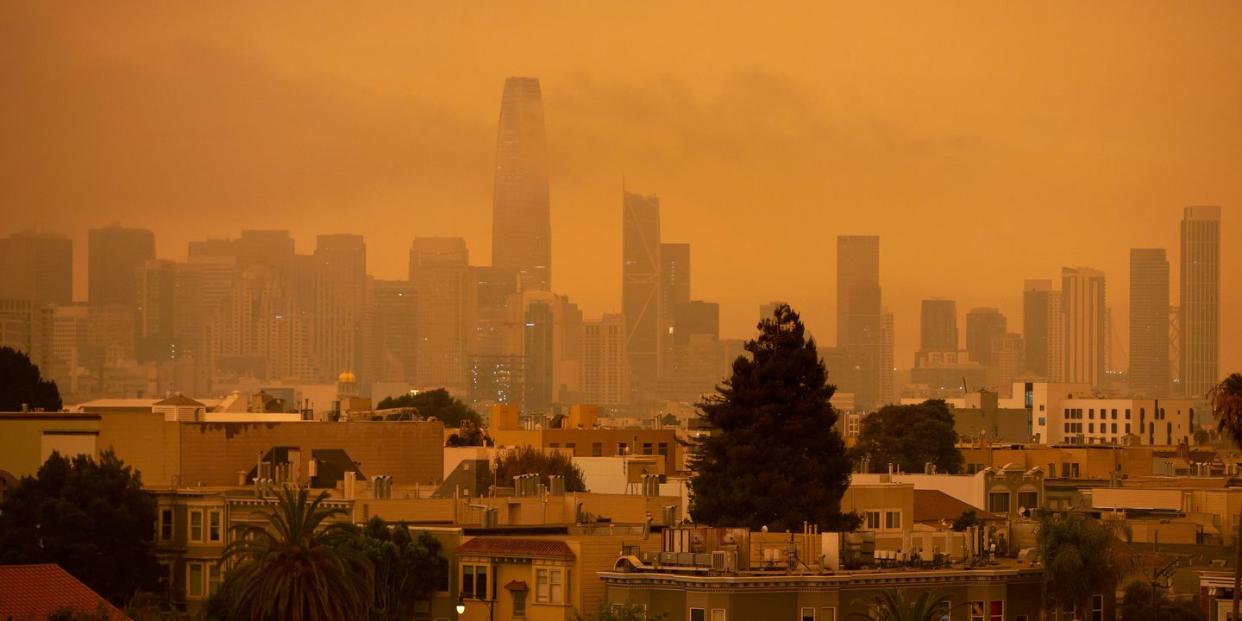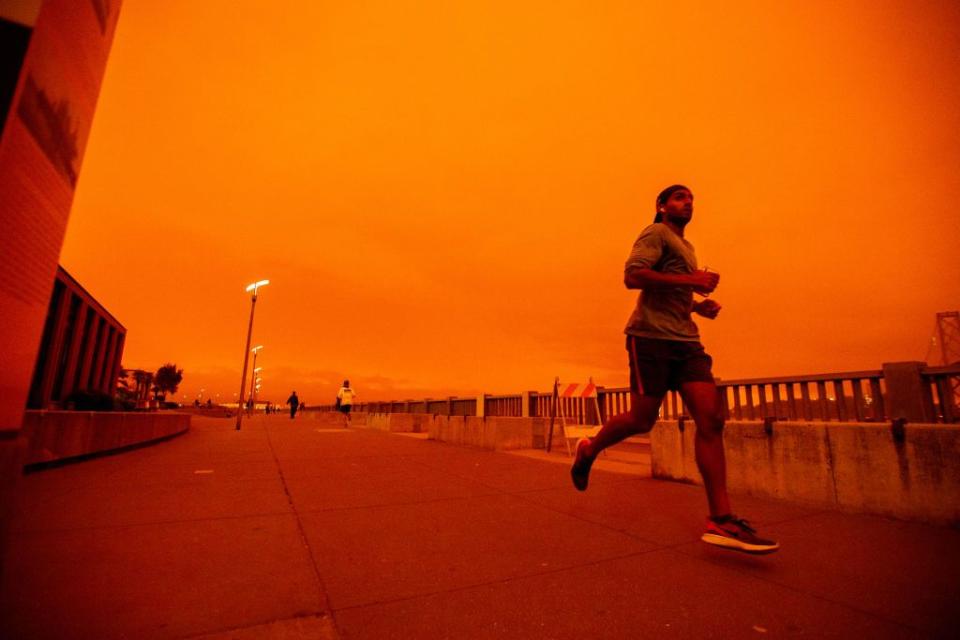Here’s What Breathing in Wildfire Smoke Can Do to Your Body, According to Doctors

The western United States is experiencing its worst wildfire season in recorded history as millions of acres burn due to endless infernos. The fires are so widespread, in fact, that they have blanketed the sky with an eerie red-orange glow and heavy smoke.
Air quality in several regions of California, Oregon, and Washington are listed as “unhealthy” or “very unhealthy,” according to AirNow, a partnership of the U.S. Environmental Protection Agency, National Oceanic and Atmospheric Administration (NOAA), National Park Service, NASA, Centers for Disease Control and Prevention (CDC), and tribal, state, and local air quality agencies.
So, what does breathing in this polluted air do to your body? Here’s what doctors want you to know, plus what you can do to protect yourself.
What are the health effects of wildfire smoke?
Wildfire smoke can hurt your eyes, irritate your respiratory system, worsen symptoms of chronic heart and lung diseases, and make you more prone to lung infections, including COVID-19, according to the CDC.
Wildfire smoke is made up of gases and fine particles, which are thrown into the air when wood and other organic materials burn, according to the Environmental Protection Agency (EPA). The microscopic particles in smoke—no bigger than one third the diameter of a hair—are the biggest concern, since they can travel deep into your lungs and spur a range of health problems.
The impact on your airways is often the biggest concern. In the short term, inhaling wildfire smoke can cause throat irritation, wheezing, coughing, a runny nose, eye irritation, and shortness of breath, says Jonathan Parsons, M.D., a pulmonologist at The Ohio State Wexner Medical Center. The American Lung Association (ALA) also points out that this form of particle pollution can trigger issues like bronchitis and asthma.
“Your airway’s first line of defense is the mucus membranes of your nose and throat,” explains Raymond Casciari, M.D., a pulmonologist at St. Joseph Hospital in Orange, California. “As air comes into your body, it impacts those mucous membranes first, and they can filter out a lot of impurities.”
But wildfire smoke creates dry air, subsequently drying out your mucus membranes. “The more dry they are, the less effective they are,” Dr. Casciari says.
Once wildfire smoke gets beyond your nose and throat, it hits your voice box, which can be come hoarse, inflamed, and irritated. Eventually, the particles make their way into your lungs. “The lungs filter out some of the impurities,” Dr. Casciari notes, but others can bypass these protections and move further into the body due to their size. “Your lungs can handle a certain amount of this, but if they’re overwhelmed by these particles you can get an inflammatory-type reaction and ultimately a fibrosis.” (Pulmonary fibrosis is a medical term for thickening or scarring of the lungs, which can ultimately make breathing more difficult.)
What’s more, research published in the Journal of the American Heart Association shows that wildfire smoke is associated with cardiovascular events, including heart attack, heart failure, and stroke, in adults 65 or older.
Inhaling large amounts of carbon monoxide—a colorless, odorless gas emitted close range to the fire—can also disrupt the amount of oxygen being delivered to the body. This can result in headaches, nausea, feeling dizzy, and even premature death, per the ALA.
Who is at the greatest risk from wildfire smoke?
The following people have the highest risk of health issues from wildfire smoke, per the CDC:
Children under 18 years old
Adults aged 65 years or older
Pregnant women
People with chronic health conditions, such as diabetes
People with respiratory conditions, such as lung disease and asthma
Outdoor workers
People who have a lower socioeconomic status, including those who are homeless or have limited access to health care
People who are immunocompromised
People who are more likely to suffer COVID-19 complications and those recovering from the virus are also at a higher risk, due to the virus’s impact on the lungs and heart.
Does it matter how much smoke you breathe in?

“The dividing line is different for everybody,” Dr. Casciari says. “People can tolerate different amounts.”
Dr. Parsons adds that it depends on whether or not you have an underlying condition. “With mild-to-moderate levels of smoke in the air—which can be estimated by the air quality index in your area—most people without lung conditions have minimal or mild symptoms. However, these levels of smoke can exacerbate underlying lung conditions in at-risk people.”
That said, being exposed to a lot of wildfire smoke is an issue for everyone. “High levels of smoke pollution from a fire can affect even healthy lungs,” Dr. Parsons says.
How to reduce your exposure to wildfire smoke
Staying indoors as much as possible is crucial, Dr. Casciari says. Beyond that, there are a few extra steps you can take to minimize your exposure:
Check your local air quality reports daily.
Try to keep your indoor air clean by keeping windows and doors closed.
Run an air conditioner if you have one, but keep the fresh-air intake closed to prevent outdoor smoke from infiltrating inside.
If you do not have an air conditioner and it is too hot inside, seek alternative shelter.
Utilize HEPA air filtration indoors, when possible.
Avoid activities that increase indoor pollution, like burning candles, cooking on gas stoves, and vacuuming.
If you do need to venture outside, Dr. Casciari warns against exercising outdoors. “When you exercise, you’re breathing in large quantities of air and bringing it into deeper parts of the lungs,” he says.
❗ If you’re living in an area impacted by wildfire smoke and you’re having difficulty breathing, seek immediate care or call your doctor for next steps.
Support from readers like you helps us do our best work. Go here to subscribe to Prevention and get 12 FREE gifts. And sign up for our FREE newsletter here for daily health, nutrition, and fitness advice.
You Might Also Like

